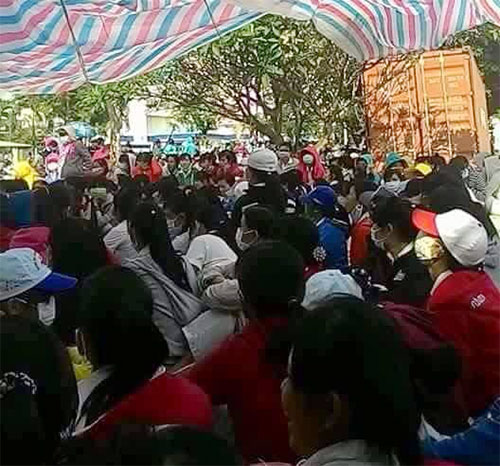Japanese company yet to reach agreement with workers over wage

Similarly to the previous days, the workers gathered in front of and around the factory, holding strong despite an earlier letter from the management threatening to fire everyone failing to resume work by Friday February 19. Since then the company has not yet issued any new notices.
The income of a worker at Nissey consists of a base wage of about VND4 million ($180) a month and allowances, such as housing and health hazard allowances, that total a little above VND1 million ($45) per person—minus health insurance, social insurance, and unemployment insurance.
At the beginning of 2016 the government raised the minimum wage in each region. Nissey raised its base wage by VND200,000 ($9) then deducted the same amount from the allowance. Due to the changes in how the insurances are calculated since the beginning of 2016, workers ultimately saw a decrease in their incomes.
The general dissatisfaction at having their real wages reduced prompted workers to start the strike on February 15, the first work day after the Tet holiday.
The management of Nissey then agreed to an allowance of VND20,000 (90 US cent) for each year in employment to workers who have been working at the factory for more than one year. However, this type of allowance cannot exceed VND200,000 ($9) per month per worker. On February 18, the management announced that they would raise the total allowance by VND100,000 ($4.5) starting April 2016.
Effectively, workers with five or more years at the company earn as much as before the cut, while newer workers continue to lose out.
On the same day, the management issued a letter saying, “If any worker refuses to resume work by February 19, the company will understand it as a will to terminate his/her contract of employment.”
Deputy president of the Vietnam Lawyers Association’s Ho Chi Minh City chapter Nguyen Van Hau said that Nissey violated the Labour Code and Governmental Decree 122 on the regional minimum wage when they unilaterally cut the allowances they undertook to provide in the employment contracts signed before the cut. This violation would result in an administrative fine of VND40-150 million ($180-670).
The chargé d’affaires of the industrial park have yet to offer a public answer.
Nissey workers also reported that the company refused to improve the quality of the food in the cafeteria, despite numerous complaints. Other complaints arose over timed bathroom breaks and sexual harassment of female workers by security guards.
The 100 per cent Japanese owned Nissey Vietnam operates in Tan Thuan Export Processing Zone in District 7 of Ho Chi Minh City. The company, which employs 3,000 workers, produces titanium eyewear, and parts for wrist watches, camcorders, fishing tools, as well as other precision mechanics products. In September 2010, dozens of Nissey workers were hospitalised due to food poisoning after eating lunch at the factory cafeteria.
Section 5 of Decree 122/2015/ND-CP on the regional minimum wage in 2016, dated November 15 last year stipulates that when companies comply to the new minimum wage requirements, they are not allowed to decrease allowances for overtime, working at night, and in hazardous working environments, etc., while other allowances and bonuses are paid according to the contract between employers and employees.
What the stars mean:
★ Poor ★ ★ Promising ★★★ Good ★★★★ Very good ★★★★★ Exceptional
Latest News
More News
- Pegasus Tech Ventures steps up Vietnam focus (February 05, 2026 | 17:25)
- The generics industry: unlocking new growth drivers (February 04, 2026 | 17:39)
- Vietnam ready to increase purchases of US goods (February 04, 2026 | 15:55)
- Steel industry faces challenges in 2026 (February 03, 2026 | 17:20)
- State corporations poised to drive 2026 growth (February 03, 2026 | 13:58)
- Why high-tech talent will define Vietnam’s growth (February 02, 2026 | 10:47)
- FMCG resilience amid varying storms (February 02, 2026 | 10:00)
- Customs reforms strengthen business confidence, support trade growth (February 01, 2026 | 08:20)
- Vietnam and US to launch sixth trade negotiation round (January 30, 2026 | 15:19)
- Digital publishing emerges as key growth driver in Vietnam (January 30, 2026 | 10:59)















 Mobile Version
Mobile Version